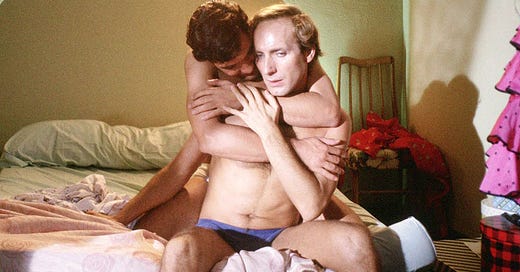Law of Desire
February 7, 1987
Written and directed by Pedro Almodóvar
If there's one thing I'm gonna do, it's loudly identify as Leo. In what might seem like falling prey to the au courant trend of astrology obsession that has overtaken Real Housewives and pop divas in the majority of queer conversations these days, it's actually become something of a balm. As Ocean Vuong said of queers and astrology in a 2019 GQ interview, "astrology gives you a framework to demystify and un-shame certain parts of yourself, even things you think are flaws, even things that the world might pathologize you for. Astrology deems it as part of your makeup, and then you can deal with it with a language that isn't shameful, which is why it has been so important for queer folks."
When the traits of a Leo are regal, talkative, born leader, performer, and someone who seeks the praise and respect of others, those are traits you can lean into. When you're faced with self-doubt or imposter syndrome, all you need is a quick reminder that the stars have pre-ordained you for greatness. But also, as a person with intense emotions and the tendency to walk the thin line between ego and gregariousness, astrology became a way to redefine every trait I'd ever felt shame or embarrassment over. And it acts as a crutch when you lean into the worst aspects of your sign—like a Leo's jealous, controlling, or possessive traits.
At our core, humans look for identities that connect us to one another. The alternative of existing in the world with unrestrained passion seems terrifying. But that's the world that Pedro Almodóvar created in his 1987 masterpiece The Law of Desire. I'm not sure astrology would mean much to the characters of this film, one bursting at the seams with passion and freedom from restraint, particularly Antonio Banderas' Antonio Benítez. A young man from a conservative background, when Antonio meets famous director Pablo Quintero (Eusebio Poncela) and they have sex (Antonio's first time having gay sex), he immediately becomes fall in love with him. More than love, actually. It becomes an obsession. When Antonio confronts Juan, a rival for Pablo's heart, before he shoves him off a cliff and murders him he confesses, "I want to possess everything that is Pablo's, because I love him."
Almodóvar describes Antonio in The Pedro Almodóvar Archives (an essential Almodóvar textbook, you absolutely must find a copy), "His passion is a force. He is a fanatic, and for someone like him, whose only morality is the expression of his passion, he can't be judged rationally because his logic isn't logical. And yet, few people are so pure, so clearly drawn, so whole." By contrast, Pablo is a director who puts all of his emotions into his writing because he prefers it to real life. He even writes the letters that Juan sends to him, only asking Juan to sign his name. He would much prefer having complete control of his life. In the final moments they spend together, after Antonio has murdered Juan and taken hostages just to spend one last night with Pablo—you can see that Pablo has fallen for Antonio. He just isn't able to express his emotions in words that aren't on his typewriter. "It is an advantage not being an artist and only having his life to deal with," Almodóvar says of Antonio.
Much like Almodóvar, I'm in awe of Antonio as I watch The Law of Desire. Despite the psychosis, to live your own life that much passion, free of shame and embarrassment, feels like Almodóvar writing the purest example of a queer character on film. And for this film to be released in 1987, just before the height of the AIDS epidemic, it's a type of queer character that would take years to be seen on film again as gay people across the globe were forced into a more restrained, shameful existence. I'm in awe of Antonio because I see myself more in Pablo, the artist who uses his work to express his emotions, because confronting them in the light is terrifying.
Both men are actually different sides of one coin, much like the extremes that exist within astrological signs. Maybe after all of this is over, I won't be ascribed so much to astrology as I am the constellations of humanity that Almodóvar has drawn in his films. In his worlds, intense emotion can be rewarded with suffering and death, but for a brief moment you might get to experience more happiness than most humans are able to achieve. But lest I think that being alive means swinging a pendulum to insane extremes—as I typed this, a text from the man I'm dating came in. On a different coast, he's at a birthday party, clearly tipsy, but thinking about me. "Goddamit, I like you," the text read. I'm always reluctant to tell people exactly how I feel about them. But the moment I responded, for a few moments, I felt alive. More alive than any other human being on earth? No. But alive enough for me. Enough to continue trying to live in honesty, rather than hiding behind constellations or words on the page. There's a beauty in being honest with yourself.




